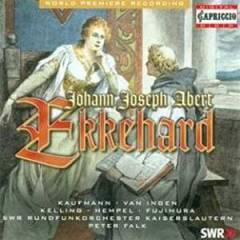Johann Joseph Abert – Ekkehard (Peter Falk) (2001)
Johann Joseph Abert – Ekkehard (Peter Falk) (2001)

CD 1 1. Vorspiel First Act 2. Herbstsonne leuchtet mit mildem Schein (1. Akt) 3. Da wären wir, dem Zwang entronnen 4. Geprobt und gesegnet sind Reben und Wein 5. Haha, mit eigenen Augen nun schaut 6. O edle Frau, übt Gnade aus Second Act 7. Da saß die Königin vor der Juno Tempel (2. Akt) 8. Klar ist es nun, ja, ich bin verschmäht! 9. Die Götter, die uns teuer 10. Wir ziehen zum heiligen Tanz CD 2 Third Act 1. Mit schönster Blumenfülle (3. Akt) 2. Der Gedanken Sturm zu bannen 3. O Herr über Leben und Tod 4. Hadwig! - Wer stört mich? Fourth Act 5. Wir sind zur Stelle (4. Akt) 6. Rings tiefe Stille, alles ruht 7. Ha, welch ein Strahl ward plötzlich dort entfacht! Fifth Act 8. Hier pflanzt das Banner Schwabens auf! (5. Akt) 9. Welch heller Klang zerreißt den trüben Wahn 10. Entsetzliches Gesicht, mein Herz erbebt Hadwig, Herzogin in Schwaben - Nyla van Ingen (soprano) Praxedis, ihre Vertraute - Susanne Kelling (mezzo-soprano) Spazzo, ihr Kämmerer - Henryk Böhm (baritone) Graf von Montfort - Jörg Hempel (baritone) Watzmann, Abt - Alfred Reiter (bass) Rudimann, Kellermeister - Christian Gerhaher (baritone) Ekkehard, Mönch - Jonas Kaufmann (tenor) Waldfrau - Mihoko Fujimura (alto) Stuttgarter Choristen SWE Rundfunkorchester Kaiserslautern Peter Falk - conductor 4.X, 1998 Festhalle, Bad Urach
This is one of the strangest operas that I have ever heard. Johann Joseph Abert (1832-1915) was born and educated in what was then Bohemia, but from the age of 21 until his death worked in Stuttgart, for 20 years as Kapellmeister. His operas were widely performed in Germany; Ekkehard was premiered in Berlin in 1878 and remained in the repertory in Abert’s adopted city until the end of the century.
Ekkehard is a monk, regarded with suspicion by his abbot because he reads such pagan authors as Virgil, but he turns out to be a doughty fighter against both paganism – the local peasants worship the ‘old gods’ Freia and Wotan – and the invading Huns (so the date – the unhelpful booklet doesn’t tell us – must be 451 AD). Both anti-Christian forces are aided by the Forest Woman, an otherwise un-named witch, but the real meat of the plot is provided by the fact that both Hadwig, Duchess of Swabia, and her confidante Praxedis are in love with Ekkehard, while the Duke of Montfort, himself in love with Hadwig, plots to murder him.
The booklet provides the libretto in German only (carelessly omitting several important passages). While listening I began fantasising about what sort of plot an innocent, non-German-speaking listener might guess had prompted such music. A rustic subject, probably (charming pastoral lyricism; folk-like choruses), with comic elements (Abert has a light touch, at times deliciously sprightly) and serious moments (chorales and a swinging battle-song) but surely nothing so earnest as conflict between races and religions, love and faith? The finale to Act 3 is a gently lyrical ensemble that gets bigger as the chorus join, but only the libretto will tell you (the music gives no hint) that it incorporates a blood-curdling curse on Ekkehard, who has (in the abbot’s view) profaned both holy ground and Hadwig’s widowhood by confessing his love for her in her husband’s funerary chapel. Who, from the pretty, lighted-footed duettino for the Forest Woman and Montfort in Act 4, could possibly guess that she is gloating over anticipated vengeance, while he rejoices in the victory within him of lust over honour and duty?
The music, in short, is often delightful, in the manner of Marschner or Lortzing, with occasional reminders that Abert was a countryman of Smetana and as a young man had played under the baton of Meyerbeer, but there is an almost total inconsistency between the music and the opera’s text. It is never boring, though, and only rarely banal; its orchestral colours are often beautiful, its vocal writing unfailingly mellifluous. A good cast of young singers (one or two of them a little stretched) does it proud; Jonas Kaufmann in particular is a lyric/dramatic tenor of rare quality and musicianship. Peter Falk directs sympathetically and the live recording (of a concert performance) is excellent. --- gramophone.co.uk
download (mp3 @320 kbs):
yandex 4shared mega mediafire cloudmailru uplea








